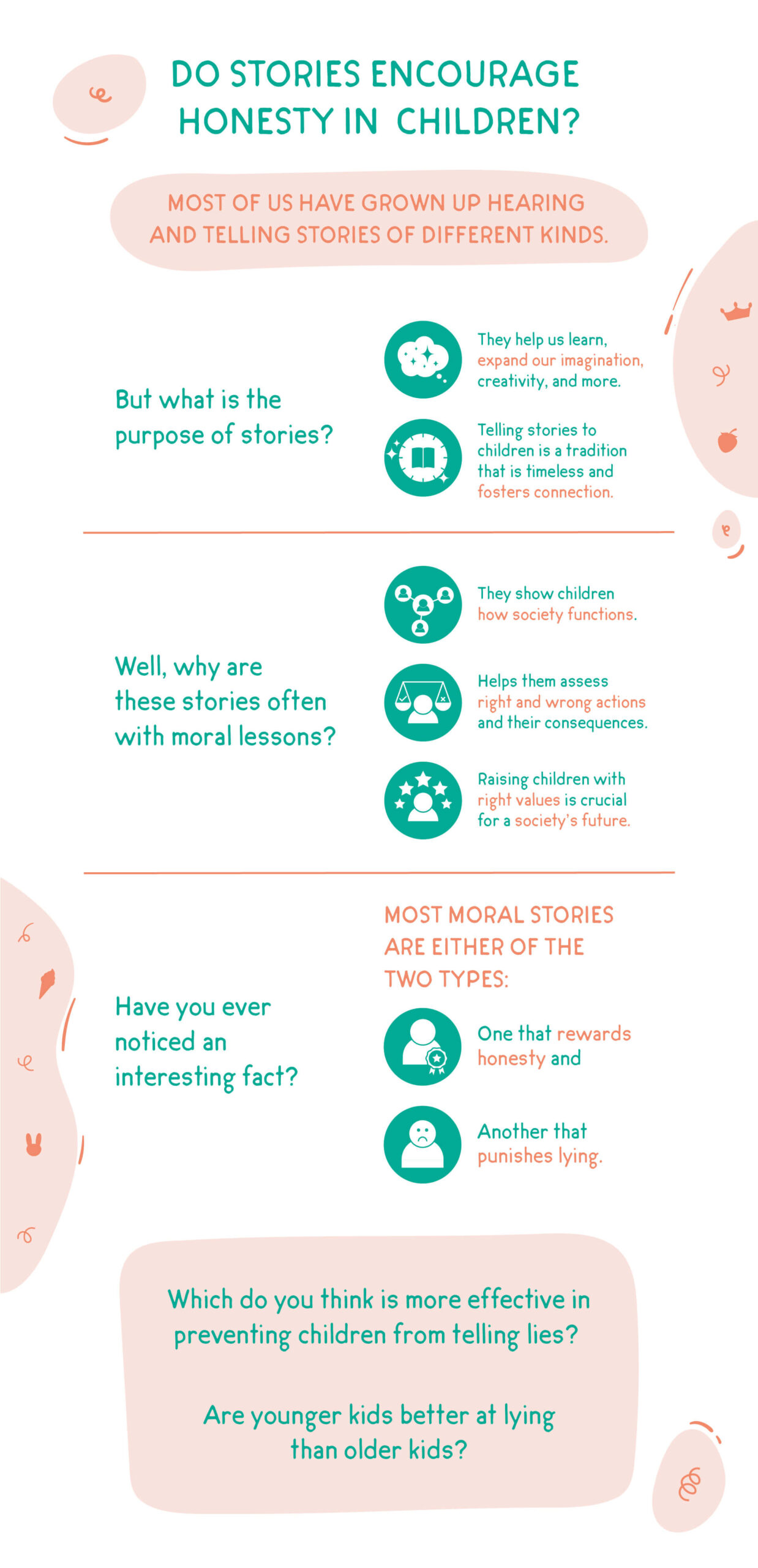Author: Inara Lalani
Raising children right is very crucial for a society’s future. To raise honest citizens, several things are put into play. This starts from home, from family, and is further carried on by agents of socialization including schools and other sectors of society. One of the most important things is to raise a child who is honest and ethical for the child to function well in society. Parents and schools often adopt numerous ways to instil this behaviour. One of these ways is the approach of reading moral stories to children. There is plenty of research on moral stories and how effective they are in helping children exercise honesty. Let’s look at what science and research tells us about the effectiveness of moral stories on children’s lying behaviour.
Moral stories that often teach honesty are of two types. The first being positive moral stories, the ones that promote honesty followed by a reward, and the second are the ones that showcase punishment as a consequence of dishonesty. Numerous studies have been conducted to experiment honesty with moral stories followed by questions to test the honesty. These studies explored if moral stories and lying behaviours are associated to each other. Moreover, to find out relationships of moral stories with children’s age, and their ability to maintain lies.
Studies were conducted on younger age groups, that is, mainly in the early stages of childhood. Researchers used 3 types of moral stories to conduct the social experiment, positive, negative, and neutral (the one that did not have any honesty lessons). There was not much impact of moral stories on children’s lying behaviour from age 3 to 6. (Butean et al., 2021) Children who read positive moral stories, the ones where positive behaviour was rewarded were less likely to lie. Age also factored in when found that older children were more likely to lie when asked a series of questions. (Butean et al., 2021).
Another study examined the same relationship between moral stories and lying behaviour but in this research experiment, children were expected to lie for another individual’s misdeed to protect them (Talwar et al., 2015). In this study of children between 4 to 7 years of age, children were also asked follow-up direct and open-ended questions. Children were able to hide their lies when asked open-ended questions initially. This is a result of an element of socialization where children learn to fit in and not snitch on people around them. Later, when faced with direct questions about the event, children who had read the positive moral story were less likely to keep lying than children who read either negative or neutral moral stories, who would mostly continue lying. (Talwar et al., 2015).
An interesting study experiment assigned children to coaching sessions (Light, moderate, and heavy) for lying in addition to reading moral stories (Talwar et al., 2017). These children were between 4 to 7 years of age. Results showed that children who read the positive moral stories, were honest when given light coaching. However, when given heavy coaching, children were able to maintain their lies when confronted (Talwar et al., 2017). This suggests that moral stories do have some impact on the behaviour of children and their ability to lie, with positive stories promoting more honesty, as compared to negative moral stories. Age also played a factor, as older children could maintain their lies with both light and heavy coaching. (Talwar et al., 2017).
In conclusion, moral stories had some effect on whether children tell lies. Research suggests that positive moral stories are better at promoting honesty than negative moral stories. This means stories that reward honesty are more effective than stories that punish dishonesty. Age significantly impacted a child’s ability to lie, with all the children initially being able to lie, but young children had a tough time lying as compared to older children.

REFERENCES:
- Butean, I., Buta, M., Visu-Petra, L., & Opre, A. (2021). Moral Stories and Young Children’s Confession of Misdeeds in Relation to Their Perception of Honesty and Its Consequences. Early Childhood Development. 32:5. 714-728. https://doi.org/10.1080/10409289.2020.1796089
- Talwar, V., Yachison, S., & Leduc, K. (2015). Promoting Honesty: The Influence of Stories on Children’s Lie-Telling Behaviours and Moral Understanding. Infant and Child Development. 484-501. https://doi.org/10.1002/icd.1949
- Talwar, V., Yachison, S., Leduc, K., & Nagar, P. (2017). Practice makes perfect? The impact of coaching and moral stories on children’s lie-telling. International Journal of Behavioral Development. 1-9. https://doi.org/10.1177/0165025417728583


